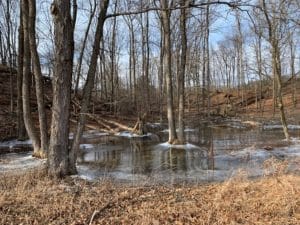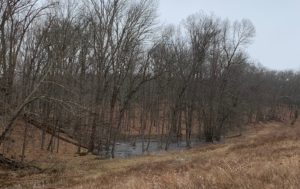Hello Fellow Readers,
What a weather pattern we’ve just endured, from snow turned to sleet, followed by zero degrees that turned trees into glass. Then, temps rose to the mid-fifties as deluges of rain rolled in. The Jacksonburg Creek, where we live, became a roaring river overflowing fifteen feet beyond the normal creek edge.
I’ve noticed with the months and months of excess rain that the pools of water on the woodland floor have not gone dry. Vernal pools, also called vernal ponds or ephemeral pools, are temporary pools of water in depressions that dry up seasonally, typically in the heat of the summer. They are essential harbors of life and are classified as unique wetlands customarily devoid of fish, though certain fish have adapted to them in tropical areas. In these parts, vernal pools don’t shelter fish, so our important amphibians and insects can readily reproduce out of reach from predatory fish.
Laws Don’t Protect the Safe Havens of Vernal Ponds
Sadly, Wetlands Laws don’t always protect vernal ponds because they are typically less than an acre in size. Builders often fill them in simply by obtaining a permit. But please don’t. According to the Conserve Wildlife Foundation of New Jersey, they offer “critical habitat for amphibians, reptiles, invertebrates, migratory waterfowl, raptors, and songbirds.” They explain, “All eighteen of New Jersey’s frog species use vernal pools to breed, and two endangered salamander species breed exclusively in vernal pools, including the Eastern Tiger Salamander.” There’s no mistaking the first sign of spring, hearing the delightful sounds of spring peepers calling for a mate.
To protect our vernal ponds, the Penn State Extension Office advises not to use chemicals or fertilizers near them, maintain the canopy of trees above them, and keep the fallen debris intact as they harbor eggs. It’s likely obvious to keep off-road vehicles and machinery clear of vernal ponds and not interfere with the critters that reside there.
I’ve been concerned about the vernal pools that didn’t dry up last summer, wondering if there is a risk the wildlife within them will not survive. According to The Pennsylvania Natural Heritage Program, not all vernal pools dry out yearly, though they all do periodically. There is comfort in knowing nature knows what she’s doing.
Garden Dilemmas? AskMaryStone@gmail.com and your favorite Podcast App.
There’s more to the story in the Garden Dilemmas Podcast –
A Related Story You’ll Enjoy: Inconsistency over Pond vs. Lake
Helpful Links for More Information about Vernal Ponds:
Vernal Ponds: Seasonal Habitats for Wildlife Vernal ponds are temporary wetlands that fill after the snowfall each spring. Published by Penn State Extension Office.
New Jersey’s Vernal Pools, by New Jersey Division of Fish and Wildlife
Column updated 10/21/23





Thank you Mary for a wonderful article, as always. I used the links to read more about vernal pools. After all the rain we have had, I hope to see and hear more frog activity than ever this spring. I certainly have more pools of standing water on my property that haven’t dried up. While Punxatawny Phil predicts an early spring, I just listen for the peepers to tell me spring has arrived!
Hello April, I appreciate you reading and commenting so kindly. The standing water has been a big concern of mine and it’s comforting to know it may help our amphibians. Funny you mention Punxsutawney Phil as he’s next week’s column topic already submitted to the newspaper :^)… I love “coincidences”…and that glorious sounds of spring. Thanks again, Mary